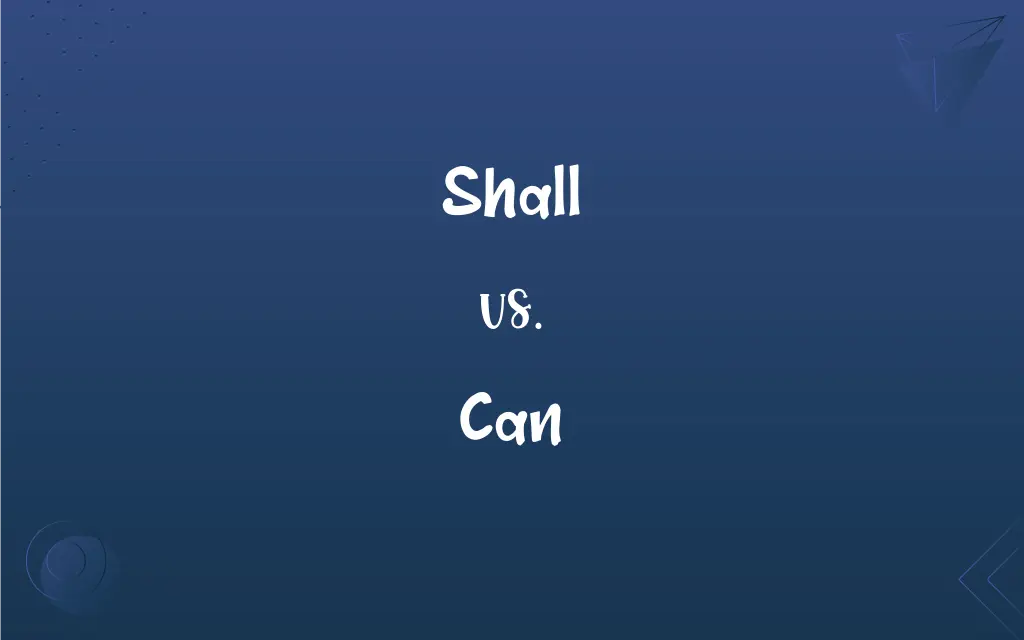Shall vs. Can: What's the Difference?
Edited by Aimie Carlson || By Harlon Moss || Published on December 2, 2023
"Shall" indicates a strong intention or requirement, while "can" denotes ability or possibility.

Key Differences
"Shall" is often used to indicate a future action, particularly in formal contexts, suggesting obligation or determination. "Can," however, refers to someone's ability or capacity to do something.
In legal and formal contexts, "shall" is used to express mandatory actions or duties, denoting a stronger sense of obligation. "Can" is less formal and implies permission or possibility, rather than obligation.
"Shall" can express a promise or a certain future event, especially in formal English. "Can" implies capability or feasibility, without the certainty or commitment often associated with "shall."
When used in questions, "shall" can suggest a suggestion or offer (e.g., "Shall we go?"), while "can" in questions is more about seeking permission or inquiring about ability (e.g., "Can I go?").
The use of "shall" is more prevalent in British English, especially for formal or future intentions. "Can" is widely used in both American and British English, with a focus on ability or permission.
ADVERTISEMENT
Comparison Chart
Usage Context
Formal, often in legal or official language
Informal, general usage
Connotation
Obligation, intention, future action
Ability, permission, possibility
Questions
Offers, suggestions
Permission, ability inquiries
Legal Documents
Implies requirement or duty
Implies permission or capacity
Cultural Preference
More common in British English
Universally used in both British and American English
ADVERTISEMENT
Shall and Can Definitions
Shall
Used to indicate future action or intention.
We shall meet at the cafe tomorrow.
Can
Expresses possibility or potential.
Anything can happen in this game.
Shall
Expresses a strong determination or promise.
I shall complete the project by the deadline.
Can
Indicates the ability or capacity to do something.
She can speak four languages.
Shall
Can be a formal alternative to will.
You shall receive the report by next week.
Can
Used in informal questions or requests.
Can you help me with this task?
Shall
Indicates an obligation or duty, especially in legal contexts.
Tenants shall pay rent on the first of every month.
Can
Suggests availability or suitability.
This room can hold up to fifty people.
Shall
Used in formal suggestions or offers.
Shall we begin the meeting now?
Can
Used to ask for or give permission.
Can I borrow your book?
Shall
Used before a verb to indicate the simple future tense in the first person singular or plural.
I shall sing in the choir tomorrow.
I hope that we shall win the game.
Can
A usually cylindrical metal container.
Can
An airtight container, usually made of tin-coated iron, in which foods or beverages are preserved.
FAQs
Can 'shall' imply a command?
Yes, in legal or formal settings, 'shall' can be used to imply a command or obligation.
When should I use 'shall' instead of 'will'?
Use 'shall' for formal contexts or to emphasize determination, especially in British English.
Is 'can' suitable for expressing permission?
Yes, 'can' is commonly used to ask for or give permission.
Are 'shall' and 'will' interchangeable?
They can be in some contexts, but 'shall' is more formal and less common in American English.
In what situations is 'can' preferable to 'could'?
Use 'can' for present ability or permission, 'could' for past ability or more polite requests.
Is 'can' appropriate for formal writing?
'Can' is more informal; use 'may' or 'is able to' for more formal contexts.
Can 'can' be used in legal documents?
It's less common; 'may' or 'is authorized to' are more appropriate in legal texts.
Can 'shall' indicate a future event?
Yes, especially in formal contexts or legal language.
How does context affect the use of 'shall'?
The context can change 'shall' from a simple future tense to an expression of obligation or determination.
Does 'can' always indicate ability?
Mostly, but it can also imply possibility or permission.
Is 'can' suitable for all types of writing?
'Can' works in most types, but in very formal writing, alternatives like 'is able to' might be better.
Is 'shall' still widely used in modern English?
It's less common in American English but still used in formal or legal British English.
How does 'shall' function in questions?
'Shall' in questions often makes suggestions or offers, especially in formal settings.
Are there exceptions to the use of 'shall'?
Yes, in legal language, 'shall' can have specific, binding implications.
What's the difference between 'can' and 'may' in asking permission?
'Can' is more informal, while 'may' is more polite and formal.
Do 'shall' and 'will' have the same level of formality?
No, 'shall' is generally more formal than 'will.'
Does 'shall' have different meanings in different contexts?
Yes, it can indicate future action, obligation, or formality, depending on context.
Is 'can' used differently in American and British English?
Usage is similar in both, though American English may prefer 'can' over 'may' for permission.
How is 'can' used in informal speech?
'Can' is commonly used for ability, permission, and informal requests in everyday conversation.
Can 'can' be used in questions about capability?
Yes, it's commonly used to inquire about someone's ability or capacity to do something.
About Author
Written by
Harlon MossHarlon is a seasoned quality moderator and accomplished content writer for Difference Wiki. An alumnus of the prestigious University of California, he earned his degree in Computer Science. Leveraging his academic background, Harlon brings a meticulous and informed perspective to his work, ensuring content accuracy and excellence.
Edited by
Aimie CarlsonAimie Carlson, holding a master's degree in English literature, is a fervent English language enthusiast. She lends her writing talents to Difference Wiki, a prominent website that specializes in comparisons, offering readers insightful analyses that both captivate and inform.


































































